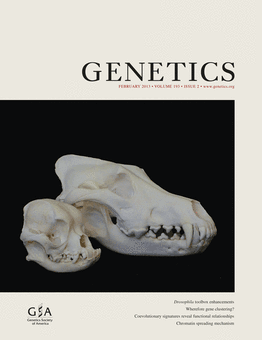
Twin Research and Human Genetics
Scope & Guideline
Bridging Twin Studies and Genetics for a Healthier Tomorrow
Introduction
Aims and Scopes
- Genetic and Environmental Influences:
The journal focuses on understanding how genetic and environmental factors contribute to various traits and health outcomes, utilizing twin studies as a key methodological framework. - Multidisciplinary Research:
It incorporates insights from genetics, psychology, sociology, and public health, reflecting the complex interplay between genetic predispositions and environmental influences. - Innovative Methodologies:
The journal publishes studies employing advanced statistical methods, including Mendelian randomization and genome-wide association studies (GWAS), to unravel the genetic basis of complex traits. - Population-Based Studies:
It emphasizes research based on diverse populations to enhance the generalizability of findings, particularly in understanding health disparities and social determinants of health. - Focus on Twin-Specific Phenomena:
The journal explores unique twin-related phenomena, such as twinning rates, twin pregnancies, and the implications of twin studies for broader genetic research.
Trending and Emerging
- Genetic Predisposition and Social Factors:
Recent studies are increasingly examining the intersection of genetic predisposition with social factors, such as socioeconomic status and perceived social support, indicating a holistic approach to understanding health disparities. - Health and Mental Health Outcomes:
There is a growing focus on the relationship between genetic factors and health outcomes, including mental health, stress, and chronic illnesses, highlighting the importance of twin studies in psychological and physical health research. - Innovative Twin Registries:
New initiatives, such as the establishment of population-based twin registries, are emerging to facilitate large-scale studies that can provide deeper insights into genetic and environmental interactions. - Application of Multiomics Approaches:
The incorporation of multiomics methodologies, including genomics, metabolomics, and epigenomics, is on the rise, allowing for a more comprehensive understanding of the biological mechanisms underlying twin studies. - Ethical and Social Implications of Genetic Research:
There is an increasing emphasis on discussing the ethical considerations and social implications of genetic research, reflecting a broader societal concern regarding genetic privacy and the use of genetic information.
Declining or Waning
- Historical Twin Studies:
There has been a noticeable decline in papers focusing on historical twin studies, as contemporary research shifts towards genetic and environmental analyses rather than retrospective assessments. - Single-Aspect Studies:
Research that concentrates solely on one aspect of twin studies, such as twin birth rates without considering broader implications or multifactorial influences, appears to be less frequent. - Cultural and Societal Perspectives on Twins:
While still relevant, the exploration of cultural narratives and societal perceptions of twins has seen a decline, as the journal leans more towards empirical genetic studies. - Clinical Outcomes of Twin Pregnancies:
Research specifically targeting clinical outcomes of twin pregnancies, while still important, is less frequently published compared to broader genetic studies or population-based health investigations.
Similar Journals

Human Genetics and Genomics Advances
Catalyzing Breakthroughs in Genomic ScienceHuman Genetics and Genomics Advances is a premier academic journal published by Elsevier, dedicated to the field of human genetics and genomic medicine. With an ISSN of 2666-2477, this journal has quickly established itself as a leading platform for disseminating cutting-edge research from its inception in 2020. Featured prominently in Q1 categories for both Clinical Genetics and Molecular Medicine as of 2023, it ranks favorably among its peers, reflected in its Scopus rankings. The journal not only offers valuable insights into the latest advancements and applications in genetics but also facilitates open dialogue among researchers, clinicians, and students. As an open access publication, it ensures that groundbreaking findings in genetics are readily accessible to a global audience, promoting knowledge sharing and collaboration. Human Genetics and Genomics Advances continues to be instrumental in moving the field forward, providing a vital resource for those at the forefront of genetic and genomic research.

Annual Review of Genetics
Pioneering Insights for the Future of Genetics.The Annual Review of Genetics is a premier academic journal dedicated to advancing the field of genetics through critical, comprehensive reviews that synthesize current research and highlight future directions. Published by Annual Reviews, this esteemed journal boasts an impressive impact factor, ranking in the Q1 category for Genetics, and holds a distinguished position as 14th out of 347 journals in the Scopus ranking for Genetics, placing it in the 96th percentile among its peers. With its convergence of knowledge from 1970 to 2023, the journal serves as an essential resource for researchers, professionals, and students alike, facilitating a deeper understanding of genetic principles and their applications. Although the journal is not open access, it remains a vital platform for disseminating high-quality, peer-reviewed content that shapes the conversation in genetics, making it a must-read for those seeking to stay at the forefront of this dynamic field.

GENETICS
Advancing the Frontiers of Genetic KnowledgeGENETICS, published by the Genetics Society of America, stands as a preeminent journal in the field of genetics, with a keen focus on advancing the understanding of genetic principles and their implications across various biological systems. Since its inception in 1945, the journal has played a pivotal role in disseminating groundbreaking research, maintaining a Q1 ranking in the genetics category as of 2023, positioning it among the top tier of academic publications. While access to the journal is not open, it continues to attract a global readership of researchers, professionals, and students eager to engage with high-quality, peer-reviewed articles that span both classical and contemporary genetics. With its publication history covering critical decades from 1945 to 2024, GENETICS is not just a repository of scientific knowledge but a vibrant forum for the exchange of ideas that drive the field forward. The journal’s commitment to excellence is demonstrated by its strategic coverage of pertinent topics, assuring its relevance for future generations of scholars.

HUMAN HEREDITY
Charting the Course of Human Genetic ResearchHUMAN HEREDITY is a peer-reviewed journal published by KARGER, dedicated to advancing the understanding of genetics and inherited traits in human populations. Established in 1950, this journal has become a vital resource for researchers, professionals, and students in the fields of genetics and clinical genetics, currently categorized in the third quartile (Q3) for both general and clinical genetics as of 2023. With an ISSN of 0001-5652, HUMAN HEREDITY provides rigorous academic content that analyzes heredity patterns and genetic variations, aiming to illuminate the complexities of human genetic inheritance. Although it does not operate on an open access model, the journal offers a comprehensive collection of studies and insights that are crucial for genetic research and clinical applications. Situated in Basel, Switzerland, HUMAN HEREDITY contributes to the global dialogue in genetics, making it an essential platform for those seeking to enrich their understanding of human heredity in a rapidly evolving scientific landscape.

NATURE GENETICS
Pioneering Insights for Human HealthNature Genetics is a premier journal in the field of genetics published by NATURE PORTFOLIO, renowned for its impactful research and significant contributions to the understanding of genetic mechanisms and their implications for human health. Since its establishment in 1992, the journal has continually maintained a strong reputation, evidenced by its impressive Q1 ranking in the Genetics category and a commendable Scopus ranking of #4 out of 347 in Genetics, placing it in the 98th percentile. Although it does not currently offer Open Access options, Nature Genetics remains a critical resource for researchers and practitioners, providing cutting-edge studies and papers that drive advancements in both fundamental and applied genetic research. With a global readership and contributions from leading scientists around the world, this journal is a vital platform for disseminating innovative findings and fostering discussions at the frontier of genetics.

RUSSIAN JOURNAL OF GENETICS
Uncovering the Mysteries of Heredity and VariationRUSSIAN JOURNAL OF GENETICS is a significant platform in the field of genetics, published by PLEIADES PUBLISHING INC since its inception in 1996. With an ISSN of 1022-7954 and an E-ISSN of 1608-3369, the journal focuses on a wide array of topics within genetics, providing researchers, professionals, and students with insights into advancements and discoveries in this ever-evolving discipline. While it currently holds a Q4 ranking in the 2023 Genetics category according to Scopus, representing invaluable opportunities for knowledge dissemination, the journal is actively working to enhance its impact in future rankings. Readers will find the journal a repository of diverse genetic research findings, methodologies, and theoretical advancements. Although it is not an open-access journal, it is committed to serving the academic community through rigorous peer-reviewed articles. With a consistent publication trajectory spanning to 2024, the RUSSIAN JOURNAL OF GENETICS remains a crucial resource for those aspiring to stay at the forefront of genetic research and applications.

ANNALS OF HUMAN GENETICS
Fostering Collaboration for Genetic BreakthroughsANNALS OF HUMAN GENETICS is a distinguished peer-reviewed journal extensively covering the field of genetics, published by Wiley. Established in 1954 and extending its influence into 2024, this journal features comprehensive research articles, reviews, and case studies aimed at advancing our understanding of human genetic conditions and their implications on health. With its ISSN number 0003-4800 and E-ISSN 1469-1809, the journal has carved a prominent niche within the academic community, currently ranking in the third quartile in both genetic and clinical genetics categories (Q3, 2023). Its Scopus rankings reflect its credibility, placing it #54 out of 99 in clinical genetics. Though it is not open access, it remains an essential resource for researchers and practitioners seeking to explore the latest findings and methodologies in genetics, serving as a critical platform for knowledge dissemination and dialogue within the scientific community. As we delve deeper into the complexities of our genetic makeup, the ANNALS OF HUMAN GENETICS continues to play a vital role in fostering innovation and collaboration in this ever-evolving field.

AMERICAN JOURNAL OF PHYSICAL ANTHROPOLOGY
Uncovering the Biological Threads of HumanityAMERICAN JOURNAL OF PHYSICAL ANTHROPOLOGY, published by Wiley, has established itself as a leading platform in the field of physical anthropology since its inception in 1918. This esteemed journal, identifiable by its ISSN 0002-9483 and E-ISSN 1096-8644, has been instrumental in disseminating groundbreaking research, achieving impressive rankings in both Social Sciences (Rank #18/443, 96th percentile) and Medicine (Rank #9/44, 80th percentile) categories within Scopus. Although its coverage in Scopus has concluded as of 2021, the journal continues to be a vital resource for academics and professionals seeking to explore the biological aspects of human evolution and variation. With a commitment to high-quality, peer-reviewed publications, the journal supports open access to enhance the visibility and accessibility of anthropological research globally. Researchers, students, and professionals are encouraged to engage with the innovative findings published in this journal, contributing to the ongoing dialogue in physical anthropology.

Frontiers in Genetics
Pioneering Interdisciplinary Insights in GeneticsFrontiers in Genetics is a premier academic journal dedicated to advancing the field of genetics through high-quality, peer-reviewed research. Published by FRONTIERS MEDIA SA in Switzerland since 2010, this Open Access journal provides a platform for researchers and practitioners to disseminate innovative findings across various subfields, including clinical genetics and molecular medicine. With a notable emphasis on interdisciplinary approaches, the journal holds a strong position in the academic landscape, achieving Q2 rankings in key categories such as Genetics and Molecular Medicine in 2023. Not only does Frontiers in Genetics contribute to the scholarly dialogue by publishing impactful studies, but it also promotes accessibility to vital research, ensuring that knowledge is available to a global audience. This journal is a vital resource for researchers, professionals, and students looking to stay at the forefront of genetic discoveries and their applications, reflective of its engagement with contemporary challenges in genetics and healthcare.

JOURNAL OF HUMAN GENETICS
Unraveling the Complexities of Human DNAWelcome to the Journal of Human Genetics, a premier publication in the field of human genetics, published by SpringerNature. With a commitment to sharing groundbreaking research, this journal has been at the forefront of genetic studies since its establishment in 1961, converging its focus in 1996 and continuing to evolve through 2024. It holds a respected Q2 ranking in both the Genetics and Clinical Genetics categories, reflecting its significant contribution to the scientific community. With a notable Scopus ranking of 23rd out of 99 in Clinical Genetics and 95th out of 347 in Genetics, the journal offers a platform for high-impact research that informs clinical practices and advances the understanding of genetic disorders. Operating under an open-access model, it ensures that findings are readily accessible to researchers, professionals, and students worldwide. Join us in exploring the complexities of human genetics and contribute to the ongoing discourse in this dynamic field.